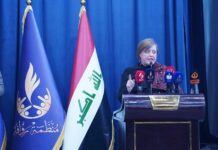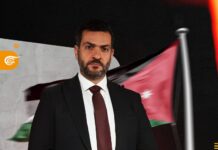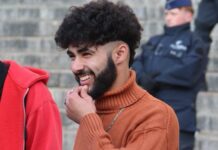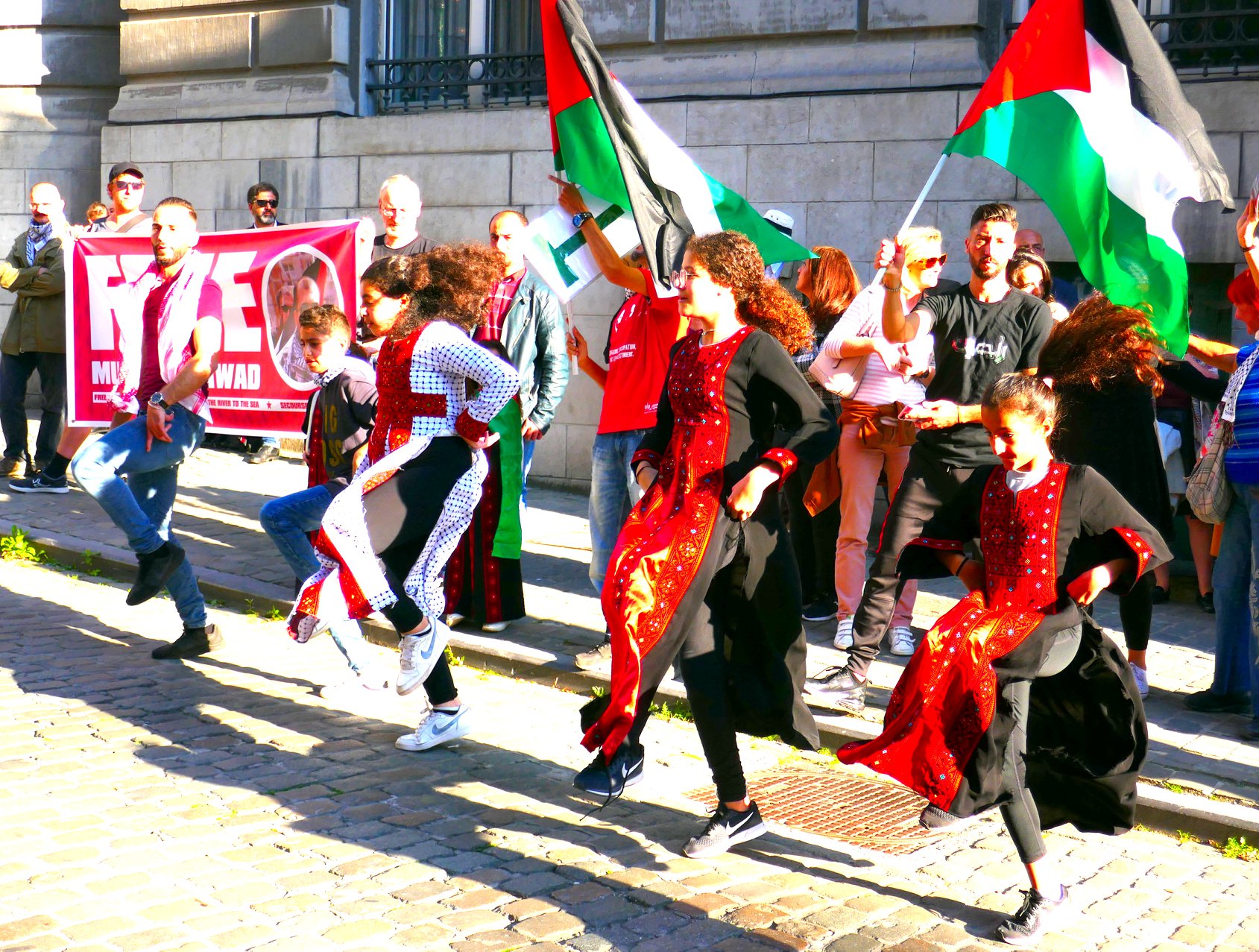
Mustapha Awad, 36, has been imprisoned by the Israeli occupation since 19 July – for nearly three months. A Belgian citizen of Palestinian descent, born in Ain el-Helweh camp in Lebanon, he is a well-known defender of Palestinian human rights and the founder of Raj’een dabkeh troupe in Brussels, which has performed across Belgium and throughout Europe. He was seized by Israeli occupation armed forces when he attempted to visit Palestine; taken inside Palestine at the Jordanian-Palestinian border, harshly and abusively interrogated and now facing political charges in Israeli court.
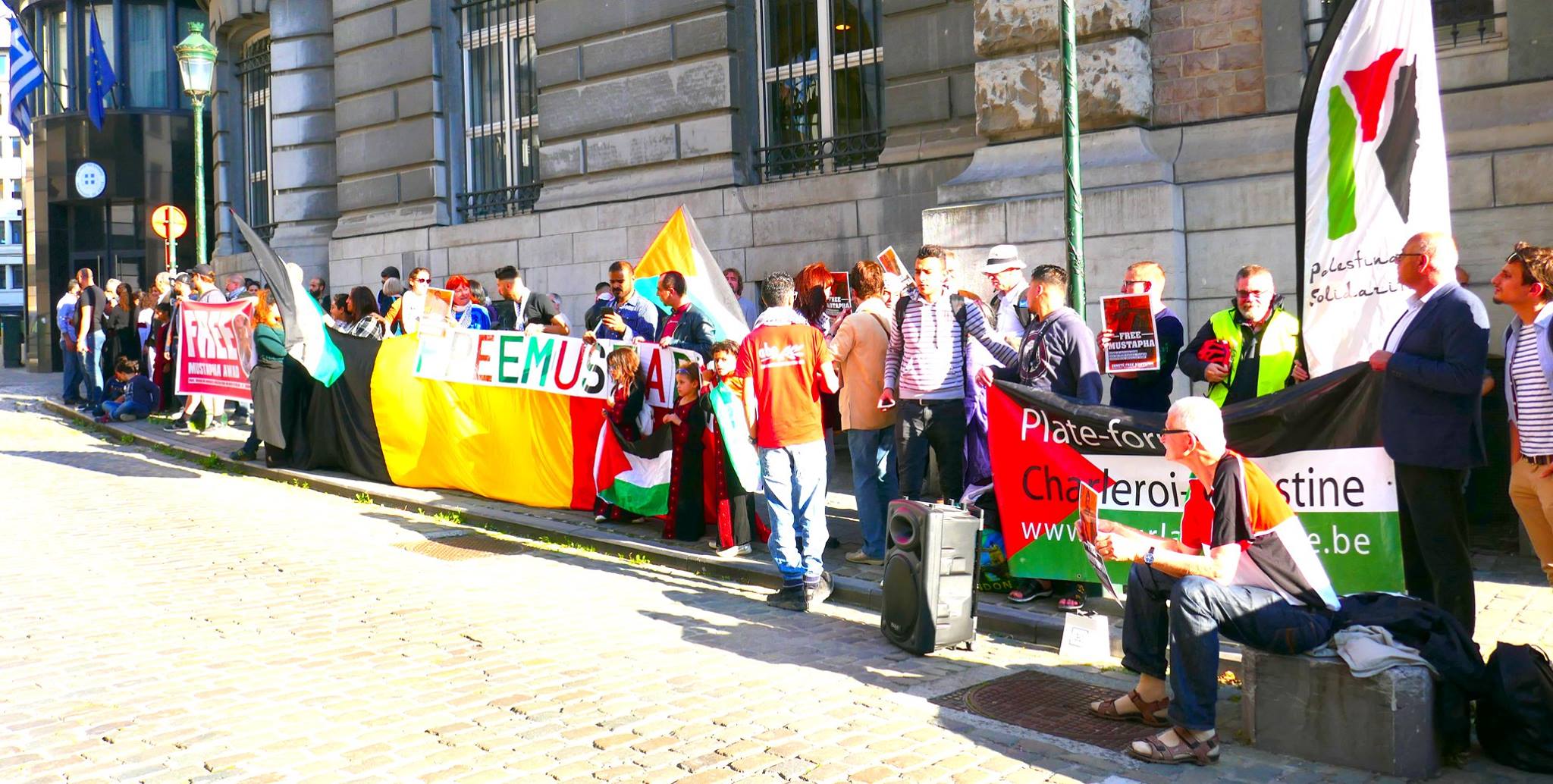
Awad appeared before the court on Wednesday, 10 October, one day after dozens of prominent Belgian intellectuals, artists and political figures signed an open letter calling for the Belgian government to take meaningful action on his case. His trial was postponed until 1 November. At the same time, many more supporters of Awad gathered outside the Ministry of Foreign Affairs in Brussels to call on Foreign Minister Didier Reynders to pressure Israel to secure his release.
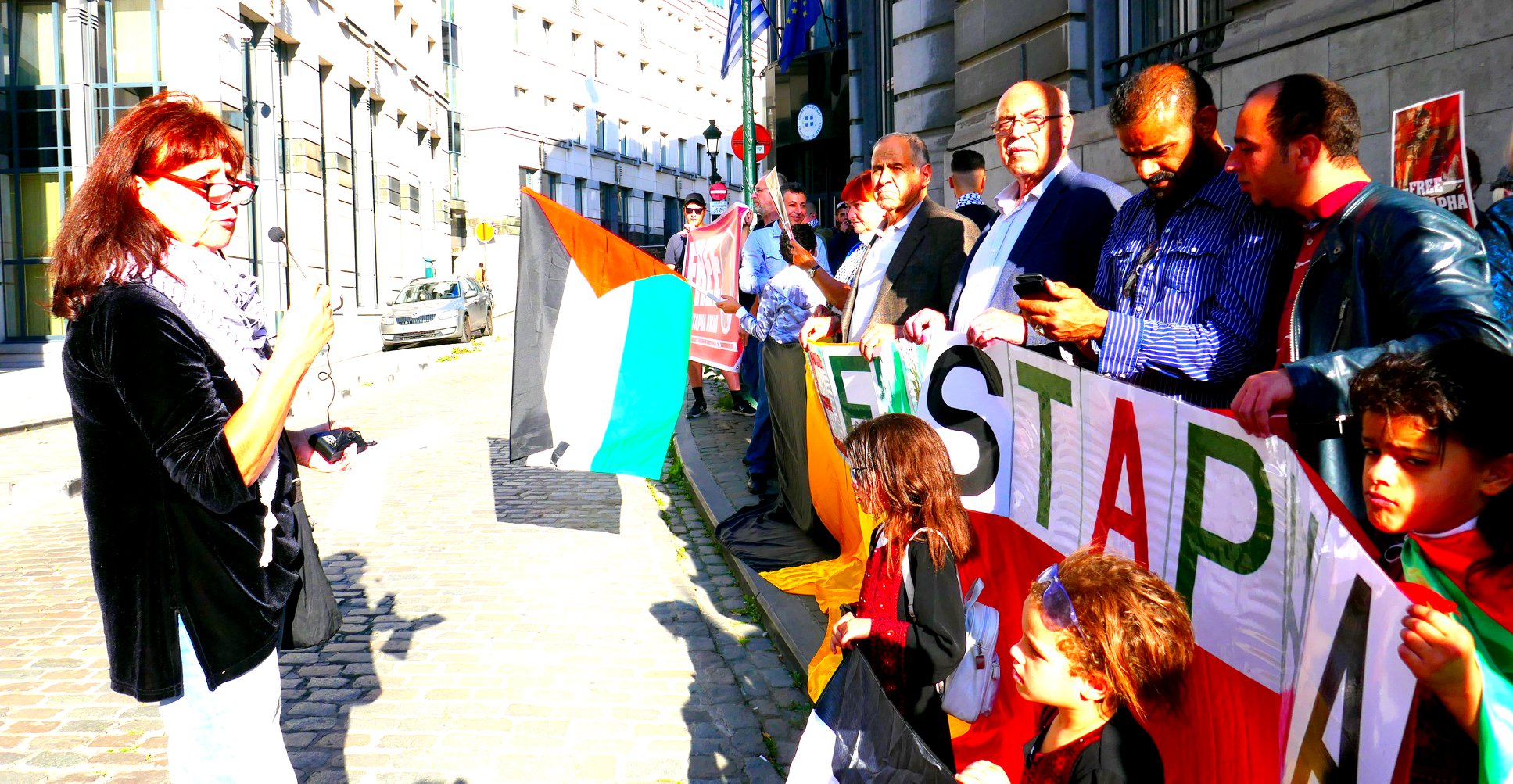
Raj’een troupe performed outside the ministry office as activists and organizers spoke to demand Awad’s freedom. They recalled their own work with Awad, a metalworker, youth activist and dancer, and highlighted Belgian and EU complicity with Israel’s ongoing human rights violations and war crimes. David Cronin, investigative journalist, spoke about Belgian and EU trade and joint research with Israel even as Palestinians face occupation, siege, extrajudicial killings and mass imprisonment.
In particular, protesters also condemned Belgian hypocrisy, an issue also raised by the open letter. Belgian-Nicaraguan student Amaya Coppens was arrested in Nicaragua and accused of involvement in armed anti-government protests and attempts to overthrow the government. However, unlike Awad, Coppens has received loud and vocal support from the Belgian government at the highest level – a fact undoubtedly connected to the fact that Nicaragua is currently subject to US and EU political intervention and destabilization, while the Israeli state is viewed as a prized ally regardless of its racism, colonialism and rampant attacks on Palestinian rights.
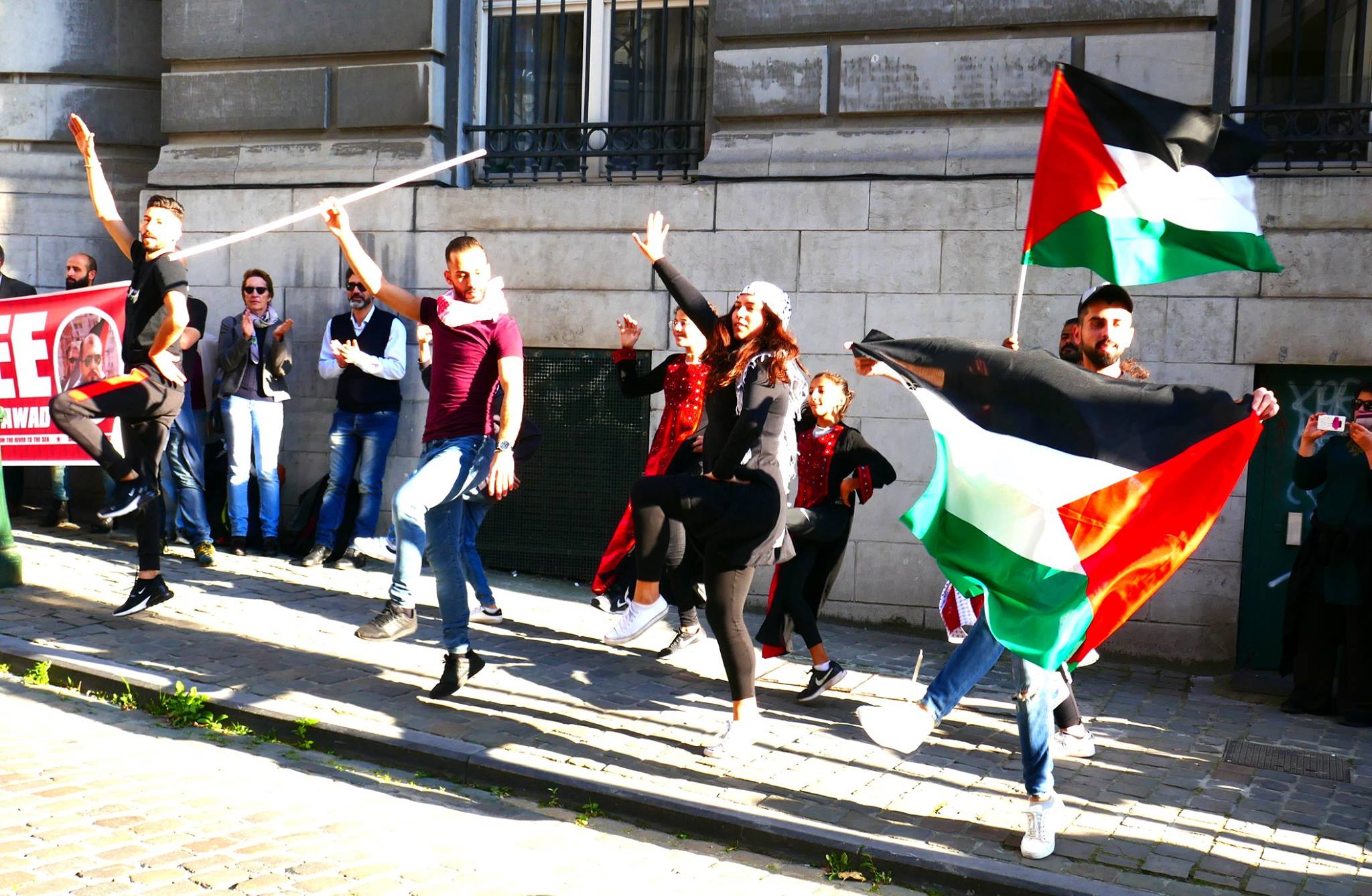
The Free Mustapha Committee is continuing its efforts to free Awad; it will organize several more protests outside the Ministry of Foreign Affairs, with another demonstration planned for Wednesday, 24 October, at 4:00 pm. In addition, several well-known artists and musicians – including Code Rouge, Manza, Lidy Fa, iMP and Sensey Shogun – are donating their time to a benefit concert on Saturday, 20 October to help raise funds for Awad’s legal defense. The concert will be hosted at the Projection Room in Uccle, a multidisciplinary art space that is also donating its resources to support the campaign.
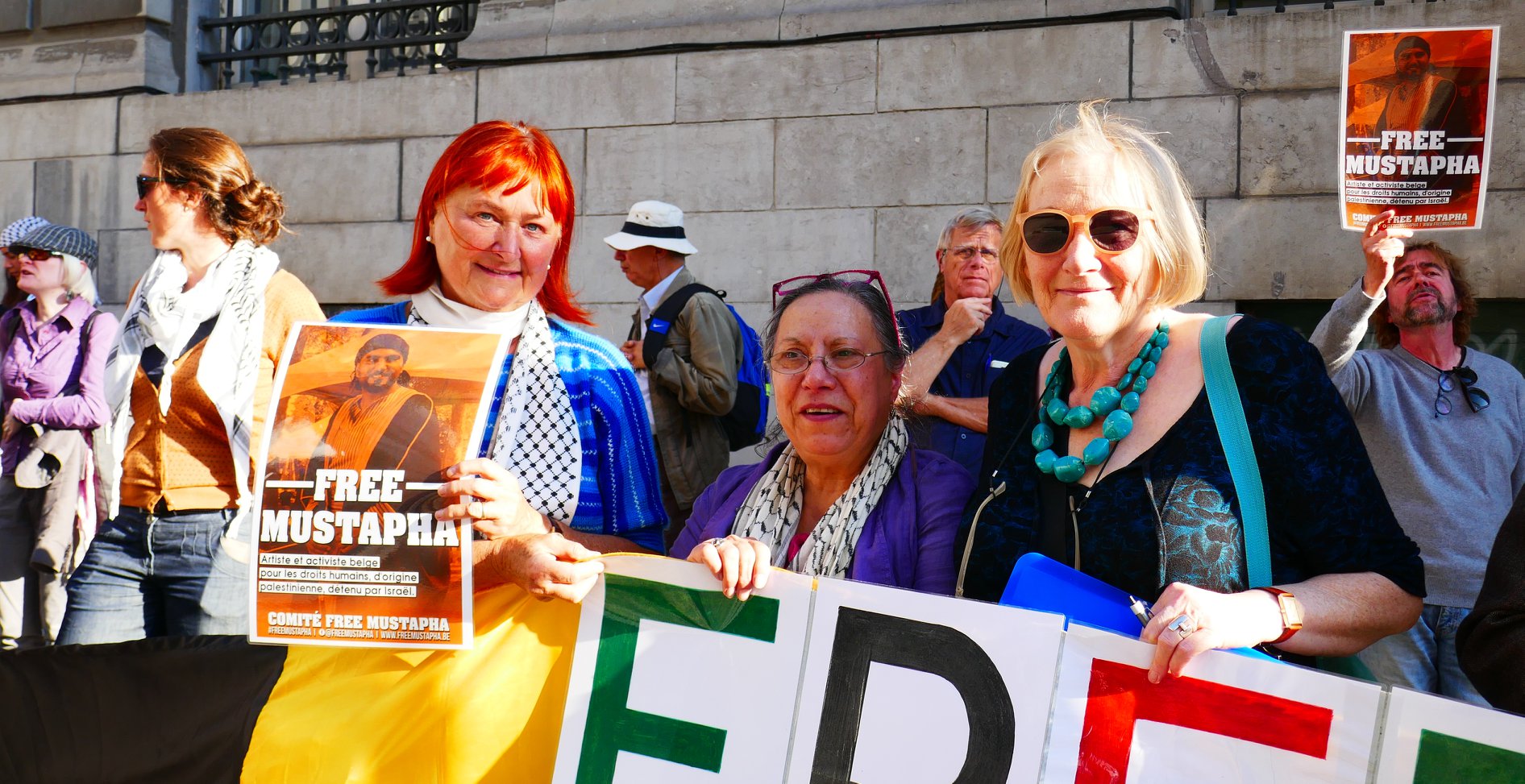
Thousands of Belgians have already signed the statement demanding Mustapha’s release, yet despite the defensive comments of Foreign Affairs minister Didier Reynders, the government’s support for Awad has been minimal. Even Reynders’ remarks give credibility to Israeli allegations, while the approach to the Coppens case has been decidedly different.
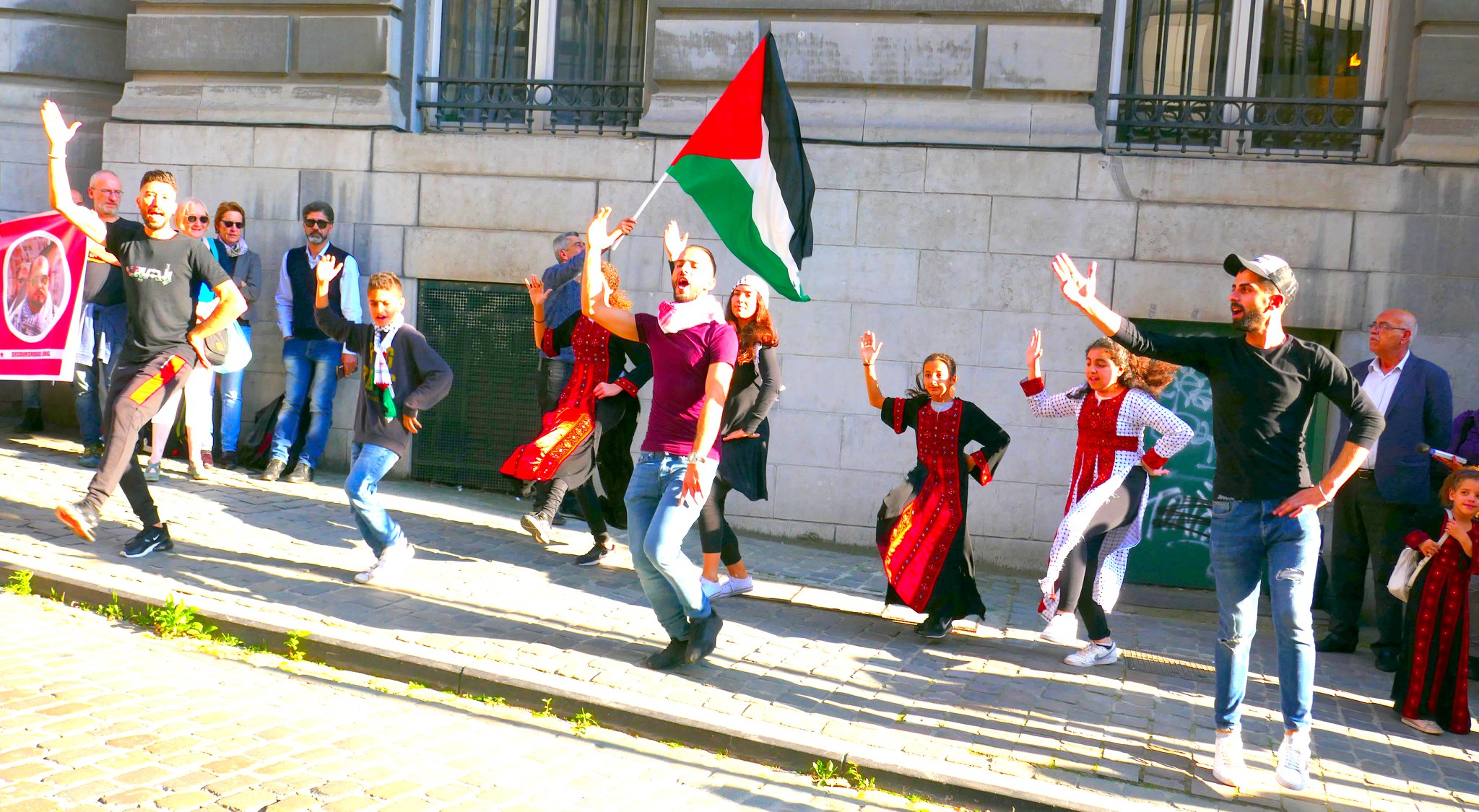
The week before, on 3 October, over 60 protesters also picketed outside the Ministry of Foreign Affairs, calling for action on the case. Alexis Deswaef, the honorary president of the League of Human Rights, made a strong speech calling on Belgium to end its hypocritical approach to its citizens’ rights.
Take Action!
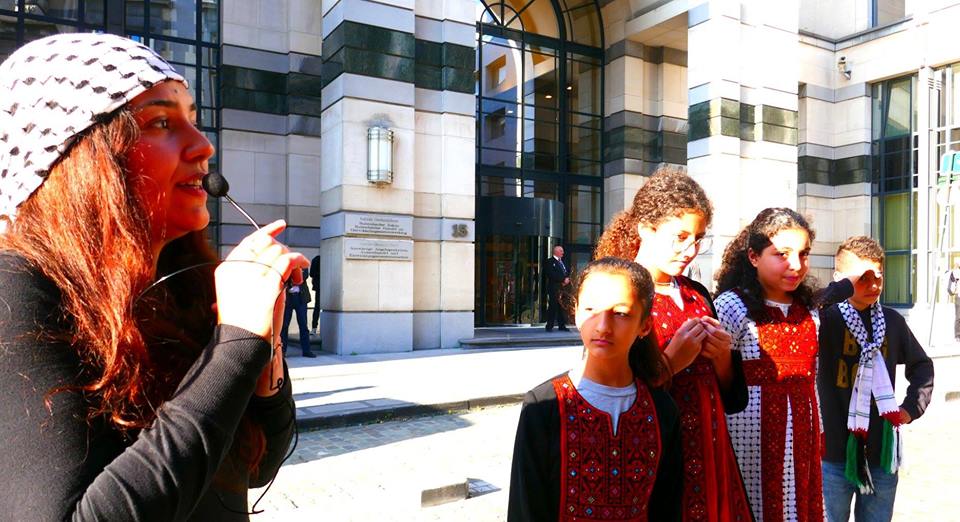
You can help build the campaign to free imprisoned artist Mustapha Awad. Please join us by taking the following actions:
- Sign on to the statement here as a group or an individual: https://goo.gl/forms/DhqopQRBo5tNGNZj1
- Join the Facebook page –> Free Mustapha Awad الحرية لمصطفى عوض https://www.facebook.com/freemustapha
- Donate to the “Free Mustapha” committee legal fund. In Europe, you can send a SEPA Transfer to:
Free Mustafa
BE96 7360 5044 3805.
BIC: KRED BE BB
- Take a “Free Mustapha” photo with the poster below and send it to the Committee at free.mustapha2018@gmail.com or submit it to the Facebook page.
The translation of the open letter by 64 prominent Belgians follows below:
On Monday, 10 September, Amaya Coppens, a young Belgian-Nicaraguan medical student, was arrested in the city of Leon, Nicaragua, by local police. She was involved in the April 19 Student Movement, which helped to lead the campaign against the government of Daniel Ortega. The charges used to justify her detention were quickly known: terrorism, carrying illegal weapons, arson, kidnapping. All of these were firmly rejected by Amaya’s relatives. Her father notes that the accusations of terrorism are part of a repressive campaign by the government and used abusively even against the most peaceful gatherings. Amaya, adds her father, is “very motivated by the fight against injustice and against the authoritarianism” of the government in place.[1]
Two days after her arrest, the Minister of Foreign Affairs, Didier Reynders, intervened personally to make it known that “if he did not manage to have effective contact in the coming days, he would obviously also contact his Nicaraguan colleague (counterpart) duiring the UN General Assembly.”[2] This is indeed what he did, after the consular authorities had previously secured a meeting between the young woman and her father. This meeting was brief, certainly, but one can imagine the relief that it could provide to Amaya and the positive influence it could have on her morale as well as that of her relatives.
At this point, Amaya is still uncertain as to her fate, but Deputy Prime Minister Reynders said last Friday that “if the statements made to him were correct,” he had “the impresssion that ‘Amaya would be one of the first prisoners to be released.'” [3]
Mustapha Awad, meanwhile, was arrested by the Israeli armed forces on 19 July, more than two months ago, at the Jordanian-Palestinian border, after several hours of interrogation. The young Belgian artist and worker of Palestinian origin has also been accused of terrorism by the Israeli state, although he has never set foot in Palestine or in Israel before, and he is also known in Belgium for his civic commitment to human rights. The charges against him remained hidden for a long time, and several weeks passed before Mustapha learned of them. He also reported being abused. Mustapha could not see his lawyer until 20 days after his arrest, at the same time as the consul, who has only been able to visit him twice since his arrest. All contact with his family has been denied, with the Israeli authorities claiming reasons of “security.”
Our Foreign Minister has remained strangely silent on the case of Mustapha, and we are still awaiting an official statement on his part condemning the inhuman treatment to which he was subjected. In view of the murky conditions of his arrest and the unlawful interrogation techniques used against him, his immediate release should be sought.
In addition, it should be noted that Amaya has dual Belgian-Nicaraguan nationality, which theoretically complicates the efforts undertaken by our diplomatic corps for her release. Mustapha is exclusively a Belgian citizen. It follows that Israel does not detain in its prisons one of its nationals or even a Palestinian national, but a foreign national, in this case a Belgian. If Belgian diplomacy, and in particular its leader, do not react with the utmost firmness to the case of Mustapha, each of us would now be entitled to believe that in the case of arbitrary arrest in any country, we would find no support from the Belgian authorities. This would be a dangerous precedent that we cannot accept.
Amaya and Mustapha. Two Belgian nationals in similar situations but whose support by our diplomatic services diverges considerably at the highest level. Quite commendable, even exemplary in one case, and partial and imperfect or even nonexistent in the other. We have the right to demand respect for the equality of each and every one of our citizens, even outside our borders.
Belgium’s commitment to the rights of its nationals abroad cannot be dependent on geopolitical interests or diplomatic calculations related ot the nature of the country involved, be it Nicaragua or Israel. We therefore call on our Foreign Minister Didier Reynders to take a public stand in favor of the respect of the law and the release of Mustapha from the Israeli authorities, as he did for Amaya with the Nicaraguan authorities.
Signatories of the open letter:
Ludo Abicht, professor at the University of Antwerp
Marc Abramowicz, founder of the Aimer center at ULB
Mateo Alaluf, honorary professor at ULB
Karel Arnaut, professor of anthropology at KULeuven
Jos Beni, honorary teacher
France Blanmailland, lawyer
Johannes Blum, retired teacher
Francine Bolle, ULB Lecturer
Jean Bricmont, professor emeritus of UCL
Fabienne Brion, professor at the Faculty of Law and Criminology at UCLouvain
Gregorio Carboni Maestri, guest lecturer, UCLouvain; teacher in architecture project, ULB
Lucie Cauwe, journalist
Marie-Christine Closon, Emeritus Professor UCL in Health Economics
Michel Collon, author and investigative journalist
Hélène Crokart, lawyer
Ludo De Brabander, spokesperson of Vrede asbl
Lieven De Cauter, philosopher, art historian and author, RITCS, School of Arts, & Department of Architecture KULeuven
Herman De Ley, professor emeritus at the University of Ghent
Marc David, professor emeritus at the University of Antwerp
Paul Delmotte, retired professor of IHECS, Brussels
Jean-Marie Dermagne, lawyer and former bâtonnier at Louvain-la-Neuve
Serge Deruette, Professor of Political Science at the University of Mons
Alexis Deswaef, lawyer at the Brussels Bar and honorary president of the League of Human Rights
Ruddy Doom, professor emeritus at the University of Ghent
Charles Ducal, writer
Baudouin Dupret, CNRS / UCLouvain
Fabrice Eeklaer, Federal Secretary CSC Charleroi-Sambre & Meuse
Mohamed El Battiui, former president of the Amazigh World Assembly
Pierre Galand, former senator
Michel Gevers, professor emeritus at UCLouvain
Pierre Gillis, professor at UMons
Corinne Gobin, political scientist at the Free University of Brussels
Johan Grimonprez, artist and filmmaker
Gwenaelle Grovonius, Member of Parliament and PS Municipal Councilor in Namur
Mejed Hamzaoui, president of the Master program in Labor Sciences at ULB
Kristien Hemmerechts, writer
Hilde Heynen, professor at KULeuven, architecture department
Wouter Hillaert, journalist and spokesperson for Hart boven Hard
Perrine Humblet, ULB Honorary Professor
Heinz Hurwitz, professor emeritus at ULB
David Jamar, sociologist at UMons
Marc Jacquemain, professor at ULiège
Gabrielle Lefèvre, journalist
Vincent Legrand, professor at UCLouvain
Marc Lenaerts, professor at the ULB and at the Brussels Academy of Fine Arts
Madeline Lutjeharms, Professor Emeritus at VUB
Frédéric Ligot, political secretary of the Christian Workers Movement
Paul Lootens, former president of the FGTB Centrale Centrale
Victor Matteucci, Mediter – Euro-Mediterranean Network for Cooperation
Xavier May, researcher at ULB
Anne Morelli, professor emeritus at ULB
Jan Orbie, Director Center for EU Studies (CEUS), Dept of Political Science, UGhent
Nadine Rosa-Rosso, teacher
Hélène Ryckmans, ECOLO deputy at the Walloon Parliament and the Parliament of the Wallonia-Brussels Federation, Senator
Christiane Schomblond, professor emeritus ULB
Dominique Surleau, General Secretary of PPrésence et Action Culturelles
Dirk Tuypens, actor
Dirk Vandermaelen, Chair of the Foreign Affairs Committee, federal MP SP.a
Claude Veraart, professor emeritus at UCL
Véronique Vercheval, photographer
Erik Vlaminck, author, president of PEN-Flanders
Luk Vervaet, former teacher in prisons
Dominique Willaert, Victoria Deluxe
Karim Zahidi, philosopher at the University of Antwerp
Discover more from Samidoun: Palestinian Prisoner Solidarity Network
Subscribe to get the latest posts sent to your email.

